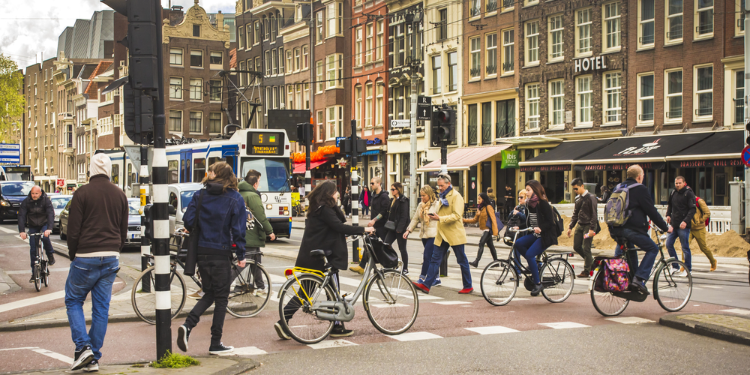
Immigration remains a central topic of debate in the European Union. As France tries to heal the wounds of a week of riots (late June to early July), discussions about immigration have fueled debates, even though the perpetrators of violence were French citizens. During the same period, the European Commission published its Eurobarometer, analyzing the perception of immigration among Europeans.
Immigration at the heart of debates in the EU
On July 10th, the European Commission released its Eurobarometer, a survey aimed at understanding the positions of Europeans on major EU issues. The June 2023 edition reveals that Europeans are aware of socio-economic urgencies. They strongly support the transition towards a greener economy, as well as the support for Ukraine and the strengthening of European defense.
While inflation and the cost of living remain the top concerns for the respondents, they have slightly decreased (from 32% in January/February 2023 to 27% in May/June 2023). The international situation, including the war in Ukraine, remains the second most significant concern for Europeans surveyed (28% in January/February 2023, unchanged at 28% in May/June 2023). However, there is a growing interest in the issues of migration and climate change. In January/February, 17% of respondents ranked immigration as the third most important issue for the EU, which increased to 24% in May/June (20% and 22% for environmental issues). But when asked about the issue that concerns them the most regarding their country, they place climate change ahead of immigration.
Nevertheless, the issue of migration crystallizes the debates. Three-quarters of the respondents would favor strengthening the external borders of the EU, and two-thirds of them support a European asylum policy that would apply uniformly to all countries.
Perception of immigration in the EU
Is there a "right-wing shift" in the perception of immigration in the EU, as some commentators claim? Extreme right-wing parties are gaining ground in the EU, especially in Italy, Greece, Spain, France, Sweden, and Finland. Hungary and Poland have been under the control of ultra-conservatives for several years. The porosity between a right-wing seeking identity and an extreme right playing on fears has given root to confusion. In a global crisis context, any statement, figure, or image can spark tensions. On July 11th, Riikka Purra, leader of the extreme right-wing party and the government's second-in-command, apologized for racist remarks posted online 15 years ago. Earlier, her colleague, Minister of the Economy Vilhelm Junnila, was pushed out for pro-Nazi statements. So is Finland still "the happiest country in the world"? Finnish President Sauli Niinistö reminded the government to "take a clear position of zero tolerance against racism."
What should be done when the immigration controversy comes from the highest level of the State? Does it truly reflect the feelings of Europeans? One could argue that the State's elected representatives speak on behalf of the people. Does this mean a "right-wing shift" in the migration issue? Opponents caution that context and manipulation of figures often work against immigrants. Many Europeans seem to consider only the immigration of people they see as non-European, while migration flows reveal a majority of European immigrants benefiting from free movement within the EU (as seen with the example of the Netherlands below).
The Netherlands at the heart of immigration debates
The whole world was shocked after Mark Rutte, the Prime Minister with exceptional longevity (in office since 2010), abruptly decided to step down following a disagreement over the immigration issue that led to the downfall of his government.
Everything happened very quickly. The four parties of the coalition led by Mark Rutte were discussing a reform of the asylum system and refugee reception. The liberal Mark Rutte has always advocated strict limitations on the right of asylum. On Wednesday, July 5th, he proposed to restrict family reunification for refugees. In detail, this meant drastically limiting family reunification to people who had fled the war because, according to Rutte, these individuals would eventually return home. The proposal sparked anger from the center-left and center partisans, who deemed it "unacceptable." After three days of intense negotiations followed, with each party standing firm on its positions, the government collapsed on July 8th, disappointing the Prime Minister, who cited "insurmountable" differences. New elections will likely have to be held in the fall but without Mark Rutte. On Sunday, July 9th, the second oldest leader in Europe announced that he would leave politics after the elections.
The battle of figures
While everything seems to have escalated in recent days, this fracture actually reveals radically different visions of immigration. For Rutte and the conservatives, a stringent policy is needed to further limit the number of asylum seekers in the country. This stance is vehemently opposed by the coalition parties D66 and Christian Union. Only the more conservative Christian Democratic Appeal party supported the government. The different camps then engage in a battle of figures, reigniting the debate.
But what is the reality?
According to the Dutch Central Bureau of Statistics (CBS), 403,000 people arrived in the Netherlands in 2022. Of these, 174,000 left, with the vast majority (80%) being people with foreign roots. This results in a net arrival figure of 229,000 for 2022. This number includes 11% of Dutch citizens returning to the country, 27% Ukrainian immigrants, 32% European immigrants and those from the European Free Trade Association (EFTA), and 30% immigrants from outside the EU and EFTA, among whom are 26,000 foreign talents who came to work through dedicated programs to attract foreign talents. These immigrants arrived with their families (39,000 people in total), mainly spouses and children.
Regarding asylum applications, the CBS recorded 27,600 requests and 11,000 people who came to reunite with a family member already granted refugee status in the Netherlands. The number is slightly higher than in 2021. In April, the government predicted a "disastrous" scenario with 70,000 refugees in 2023. However, the CBS has a more tempered view. Between January and May, asylum applications slightly decreased compared to the previous year: 18,300, which is 1,300 fewer than in 2022 during the same period. The CBS predicts a total number of new refugees below 45,000.
What is the profile of immigrants?
For conservatives, immigration is surging and is too significant for the size of the country. However, opponents argue that these figures must be considered in an international context. Firstly, the pandemic years halted travel, and the increase in the number of immigrants is a catch-up from that period. The same applies to asylum seekers. The war in Ukraine also led to a rise in immigration, as Ukrainians fled the country, seeking refuge, including in the Netherlands.
Contrary to some conservative discourses, Europeans constitute the largest group of immigrants in the Netherlands. This has been a consistent trend since 2007 (except for 2016, when many Syrian and Iraqi refugees were welcomed). Let's recall that the European free movement allows Europeans to circulate freely within the EU, including the Netherlands. Refugee advocacy groups point out that Dutch policy already restricts family reunification to partners and children under 25 years old. Therefore, "endless hordes" of family reunifications, as feared by conservatives, are not possible.
Why this debate? Like everywhere else, every crisis has its scapegoats. The country is caught in a real estate crisis and lacks housing. For the opposition, the government has failed in its policy of welcoming and housing refugees, even as they continue to seek international talent. This "double standard" policy reinforces inequalities. Moreover, the labels used play a role. While the term "expatriates" refers to qualified workers, "migrant workers" refers to people from Central and Eastern Europe who hold low-skilled jobs. This cheap labor force is often exploited by employers and unscrupulous recruitment agencies. In total, nearly 900,000 European nationals reside in the Netherlands.
Conclusion
Nevertheless, the European Union is gaining population thanks to immigration and is making up for the years of decline caused by the pandemic. For European countries with aging populations, immigration is essential. Even the most right-wing states are recruiting foreign workers at the same time. However, there is a clear distinction between non-skilled and skilled workers and between non-Europeans and Europeans.
Debates about immigration are fueled by fears and misconceptions. Yet, it would be incorrect to perceive immigration solely from this angle. Other thinkers argue that if the migration question remains so sensitive, it may be because many discussions only present it as a problem.
Consequently, it becomes difficult to see the positive aspects, which are real and numerous (such as the economic and demographic effects). The media and social networks often paint a limited perspective, concealing the reality on the ground where people are aware that immigration remains essential for the well-functioning of countries.




















Comments
1In general, immigration is appreciated in Europe. This is applicable to skilled labour and foreign investors. However, as a lot of scam asylum seekers came to Europe some so-called right wing people are critical about immigration. In most countries of this world criminals will not get asylum in another country because they will face prosecution in their own country. For this reason, conservative groups of the EU want all migrants being screened before they reach Europe.